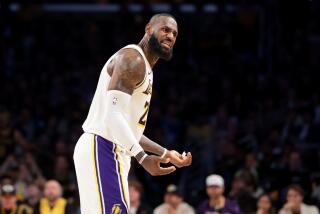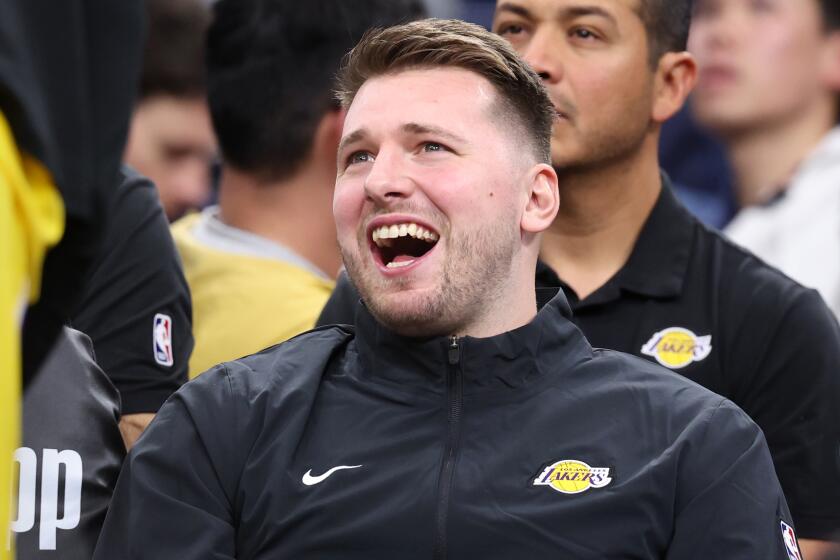Bailing Out in Portland
- Share via
PORTLAND, Ore. — Frank and Mary Gill’s season tickets at the Rose Garden used to place them among the most coveted locations in the city: second row, Seats 7 and 8, about 25 feet from the middle of the court at every Portland Trail Blazer home game.
Now the only thing their seats offer is a prime view of a once-proud franchise in its decline. The Gills occupy them at their own risk; Frank was hit by a piece of chewing gum that Trail Blazer Bonzi Wells threw in frustration last season.
They keep coming because they’re loyal and, like a bad cellular phone service contract, they’re stuck in a long-term deal. But for many in the Portland community their ties to the team are loosening, unraveled by the players’ extraordinary run of misguided acts and their increasingly mediocre performance on the court.
The Gills hold another pair of season seats on the opposite side of the court, and “some games it’s so bad we can’t give those other tickets away,” Frank Gill said.
Average attendance is 16,309, about 3,000 below capacity. The Trail Blazers sold out the final 809 games at the old Memorial Coliseum before moving to their new home in 1995. They had a run of 104 consecutive sellouts that ended two years ago.
What happened to the franchise that used to be more central to the city’s identity than the Willamette River that runs through its heart?
You can find the answer in the police blotter, where the Trail Blazers have made regular appearances in connection with a variety of illegal-substance or moving-vehicle violations (sometimes simultaneously) and violent acts.
You can find it on the court -- that is, when league and team suspensions aren’t keeping the players off it -- with a team whose performance never equaled the talent on the roster.
Consider the lineup the Blazers had on the floor during the fourth quarter of Saturday night’s game against the Lakers. It included Rasheed Wallace, just more than a year removed from a marijuana possession arrest and fresh off a controversy over his racially tinged comments on the state of owner-player relations in the NBA. And Damon Stoudamire, with a string of marijuana arrests on his record. There was Ruben Patterson, who two years ago entered an Alford plea to charges of forcing his nanny to perform a sex act. (In an Alford plea, a defendant does not admit guilt, but acknowledges that prosecutors have enough evidence to convict him at trial.) And there was Zach Randolph, the promising young player whom the Blazers would like to consider their primary building block for the future, but who brought back the same old headlines from the past with an arrest on charges of driving under the influence of intoxicants this month.
At least Randolph and Patterson were coexisting. During a practice last spring, Randolph sucker-punched Patterson, breaking his eye socket. Even at the lowest point of the feud between Shaquille O’Neal and Kobe Bryant, the Laker superstars never uttered a phrase as cold as Patterson’s thoughts on Randolph, as told to the Portland Tribune in the off-season: “Deep down in your heart, you want to kill the guy.”
As Portland center Dale Davis said, “The thing with our group is, sometimes we don’t do a good job of trying to alleviate some of the stuff that’s going on. We may add to it instead of making it go away.”
It leaves those who care about the franchise only two choices: Fire off angry e-mails to the Oregonian newspaper, or shake their heads.
“It’s very disappointing, very sad to see it fall to the level that it has, because it was so special when I was there as a player, and guys that came before me,” said Mychal Thompson, the Laker radio analyst who spent the first seven seasons of his NBA career in Portland after the Trail Blazers selected him with the first pick in the 1978 draft.
He remembers how it was in the late ‘70s and early ‘80s, when the community known as “Rip City” (a phrase coined by radio play-by-play man Bill Shonely) was still basking in the 1977 NBA championship won by the only major professional team in the state.
“Everybody wanted to be associated with you, wanted to make you feel like you were part of the community, part of their family,” Thompson said. “Sponsors would come to you ... to sponsor and endorse their products. Now they’re running away from the Blazers.”
A quarter-century has passed since the team’s only championship, and it has been more than a decade since its last trip to the NBA Finals in 1992. Those were different teams, different eras. Even the high point of recent years is starting to fade into the deeper regions of the memory banks.
In Game 7 of the 2000 Western Conference finals, the Trail Blazers held a 15-point lead over the Lakers in the fourth quarter. Then they tightened up, couldn’t make a shot and watched the Lakers move on to the NBA Finals and the first of three consecutive NBA championships.
The Trail Blazers haven’t made it past the first round of the playoffs since. Only two players who were in that game are still on the team: Stoudamire and Wallace. But they aren’t viewed as holdovers from the glory days; they’re considered part of the problem, a reminder of the team put together by former club president Bob Whitsitt that once featured 10 starting-caliber players, but lacked chemistry -- and common sense.
“The only people that are really mainstays are me and ‘Sheed,” Stoudamire said. “When me and ‘Sheed do leave -- if we leave -- then I guess you will see if the stigma will change. I don’t know if the stigma will ever change. That just seems like the way we’re talked about and how it’s going to be.”
Owner Paul Allen cut loose Whitsitt last summer and hired Steve Patterson as president, and Patterson hired John Nash as general manager. The Blazers instituted a 25-point code of conduct.
The pledge came out after Stoudamire’s third marijuana-related arrest, this time for allegedly attempting to bring marijuana through an airport security checkpoint in July. But it was in effect before Randolph’s arrest. And it was in effect before Wells made an obscene gesture to a fan and cursed Coach Maurice Cheeks on the sideline.
The Blazers fined and suspended Wells, then traded him to Memphis for Wesley Person.
“I guess the trade of Bonzi Wells acknowledged that we were going to do business differently than we’ve done in the past,” Nash said.
Nash said that “we’ve taken a step back with talent” by trading the versatile Wells. But they tried the other route, putting talent first, and all it got them was trouble.
So now where do they go? They don’t have an established star to lead them now, especially with Wallace playing inconsistently, and Randolph isn’t ready for stardom yet.
They still have an $82-million payroll bloated with huge contracts that won’t be easy to move. However, all but four of those contracts will expire by the end of next season.
“I think the fans really are concerned about the character issues more than anything else,” Nash said. “The fans are saying they don’t care about the winning. But that’s possibly because they’ve had 21 consecutive playoff appearances and they’re not sure what losing is like.
“I know how bad losing is,” said Nash, the general manager of the New Jersey Nets from 1996-2001.
“The team that we currently have may be good enough to make the playoffs and may be not. But we’re going to address the character issue, whether it’s by trade or what we do when these contracts expire.”
Stoudamire, who has another year left on his contract, understands that he could be traded. He realizes his part in this situation.
“I’ve done things in the past,” Stoudamire said. “I’m not saying I’m a choirboy and I haven’t done anything, but I’m trying to face my issues. I’m trying to address my issues. I’m moving forward. I don’t want to be in that place anymore.”
And he poses an interesting question to the fans about a Trail Blazer future that might not include him.
“Do you really want to see this thing go all the way down and then come back up, or would you rather always stay kind of like, well, we’re going to fight for that sixth, seventh, eighth [playoff] position?” Stoudamire said. “I’m a realistic guy. That’s where we’re at. We’re not an upper-echelon team in this league and in this conference right now. We’re not there. We don’t have the same depth like we had in the past. I think we can compete. But what are we going to do? Are we going to go all the way down and come back up or are we going to stay borderline?”
Either way, don’t expect too many people to watch the transition.
“They really squandered the goodwill they had in the community,” Frank Gill said.
“That’s what makes it so sad, is that it was going so well,” said his wife, Mary. “This town really embraced them and it took a few of these bad guys to turn it around. What a shame.”
Said Frank: “They don’t even have to have a winning team and be in the playoffs. If they just had decent guys that played hard, this place would be full. People aren’t showing up because they think they’ve got such jerks on the team.
“Rip City is long gone.”
*
(Begin Text of Infobox)
Trailing, Not Blazing
Portland has been going downhill. A look, including the team’s regular-season finish in the Western Conference:
*--* Season Record West 1999-00 59-23 2nd Playoff result: Lost to Lakers, 4-3, in Western Conference finals 2000-01 50-32 7th Playoff result: Lost to Lakers, 3-0, in Western Conference first round 2001-02 49-33 6th Playoff result: Lost to Lakers, 3-0, in Western Conference first round 2002-03 50-32 6th Playoff result: Lost to Dallas, 4-3, in Western Conference first round 2003-04 11-10 T-10th Playoffs: In danger of missing postseason for first time in 22 seasons
*--*
*--* Roster Changes The team that went to the 2000 Western Conference finals: Players departed: Steve Smith, Scottie Pippen, Arvydas Sabonis, Bonzi Wells, Detlef Schrempf, Brian Grant, Greg Anthony, Gary Grant, Jermaine O’Neal, Stacey Augmon, Antonio Harvey, Joe Kleine Players remaining: Rasheed Wallace, Damon Stoudamire
*--*










